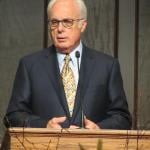From GRACE, with Boz Tchividjian ([email protected]) and NetGrace:
A Public Statement Concerning
Sexual Abuse in the Church of Jesus Christ
Recent allegations of sexual abuse and cover-up within a well known international ministry and subsequent public statements by several evangelical leaders have angered and distressed many, both inside and outside of the Church. These events expose the troubling reality that, far too often, the Church’s instincts are no different than from those of many other institutions, responding to such allegations by moving to protect her structures rather than her children. This is a longstanding problem in the Christian world, and we are deeply grieved by the failures of the American and global Church in responding to the issue of sexual abuse. We do not just believe we should do better; as those who claim the name of Jesus and the cause of the Gospel, we are convinced we must do better. In the hope that a time is coming when Christian leaders respond to all sexual abuse with outrage and courage, we offer this confession and declare the Good News of Jesus on behalf of the abused, ignored and forgotten.
Through the media we have been confronted with perpetual reports of grievous sexual abuse and its cover-up. Institutions ranging from the Catholic Church, various Protestant churches and missionary organizations, Penn State, Yeshiva University High School, the Boy Scouts, and all branches of our military have been rocked by allegations of abuse and of complicity in silencing the victims. And while many evangelical leaders have eagerly responded with outrage to those public scandals, we must now acknowledge long-silenced victims who are speaking out about sexual abuse in evangelical Christian institutions: schools, mission fields and churches, large and small. And we must confess we have done far too little to hear and help them.
Holocaust survivor and author, Elie Weisel, once said, “Neutrality helps the oppressor, never the victim…silence encourages the tormentor, never the tormented.” When we choose willful ignorance, inaction or neutrality in the face of evil, we participate in the survival of that evil. When clergy, school administrations, boards of directors, or military commanders have been silent or have covered up abuse, they have joined with those who perpetrate crimes against the “little ones” – often children, but also others who are on the underside of power because of size, age, position or authority.
It goes without saying that sexual abuse is criminal, but within the Church we also believe that it is the work of the enemy of our souls — evil, horrific sin perpetrated in dark and hidden places, forever altering lives and destroying the faith of the abused. How could such evil be present and overlooked in the body of Christ? Surely as his followers, we would do everything in our power to expose the deeds of darkness, opening the mouths of the mute, the afflicted and the needy. The Church must never hinder those who so desperately need to run to God and his people for safety, hope and truth, while also providing them protection from the great deceiver.
But we have hindered the victims. By our silence and our efforts to protect our names and institutions and “missions,” we, the body of Christ, have often sided with an enemy whose sole purpose is and has always been to destroy the Lamb of God and his presence in this world. Our busyness and inattention have often resulted in complicity in allowing dark places that shelter abuse to fester and survive.
We must face the truths of our own teachings: To be a shepherd in the body of Christ and blind to the knowledge that your sheep are being abused by wolves in your midst is to be an inattentive shepherd. To judge merely by outward appearances is a failure of righteousness. To fail to obey the laws of the land as Scripture commands by declining to report and expose abuse is to be a disobedient shepherd. To be told that wolves are devouring our lambs and fail to protect those lambs is to be a shepherd who sides with the wolves who hinder those same little ones from coming to Jesus. To fail to grasp the massive web of deception entangling an abuser and set him or her loose among the sheep is to be naïve about the very nature and power of sin. To be told a child is being or has been abused and to make excuses for failing to act is a diabolical misrepresentation of God. To know a woman is being raped or battered in hidden places and silence her or send her back is to align with those who live as enemies of our God. Protecting an institution or organization rather than a living, breathing lamb is to love ministry more than God and to value a human name or institution more than the peerless name of Jesus.
Dear church of Jesus Christ, we must set aside every agenda but one: to gently lead every man, woman and child into the arms of our Good Shepherd, who gave his very life to rescue us from the clutches of our enemy and from sin and death — who rose from the dead and called us to the safety of his side. As we follow this Good Shepherd, we will “eliminate harmful beasts from the land, make places of blessing for the sheep, deliver them from their enslavers and make them secure in places where no one will make them afraid” (Ezekiel 34:25-28). Surely it is for such a time as this that the Church has been empowered to boldly and bravely embody the Good News to accusers and accused alike, and to forsake our own comfort and position to love the hurting with an illogical extravagance.
To all who have been abused, broken, deceived and ignored, we have failed you and our God. We repent for looking nothing like our Lord when we have silenced you, ignored you or moved away from you and then acted as if you were the problem. You are not the problem; you are the voice of our God calling his church to repentance and humility. Thank you for having the courage to speak truth. May God have mercy on us all and oh may the day come when his church reflects the indescribable love and compassion of Jesus, even to the point of laying down our lives for his precious sheep.
Dated this 17th day of July, 2013.
Click here to add your voice and sign this statement along with those listed below.
Carol Ajamian, Retired
Jim Arcieri, Pastor of Community Bible Fellowship Church in Red Hill, PA
William S. Barker, Professor of Church History, Emeritus at Westminster Theological Seminary (PA)
Steve Brown, Professor, Emeritus of Preaching and Pastoral Ministry at Reformed Theological Seminary, President of Key Life Network, Inc., and Author
P. J. (“Flip”) Buys, Associate International Director of the World Reformed Fellowship, South Africa
Rebecca Campbell, Member of the Board of Trustees at Biblical Theological Seminary
Alan Chambers, Founder, Speak.Love
Kelly Clark, Attorney with the law firm of O’Donnell Clark and Crew, LLP in Portland, OR
Julie Clinton, President of Extraordinary Women
Tim Clinton, President of the American Association of Christian Counselors and Professor of Counseling and Pastoral Care at Liberty University
Wentzel Coetzer, Professor of Theology at Northwest University (Potschefstroom, South Africa)
James Courtney, Ruling Elder at Trinity Presbyterian Church (PCA) in Rye, NY
Margaret Courtney, Co-Director of Family Ministries at Trinity Presbyterian Church (PCA) in Rye, NY
Glenn Davies, Bishop of North Sydney, Australia
D. Clair Davis, Chaplain at Redeemer Seminary
Chuck DeGroat, Associate Professor of Counseling and Pastoral Care at Western Theological Seminary and Senior Fellow at Newbigin House
Mary DeMuth, Author and Blogger
David G. Dunbar, Professor of Theology at Biblical Theological Seminary
Diana S. Durrill, Pastor’s wife and Sexual abuse survivor
Michael J. Durrill, Pastor of Valley Community Church in Louisville, CO
William Edgar, Professor of Apologetics at Westminster Theological Seminary (PA)
Rob Edwards, Pastor of Mercy Presbyterian Church (PCA) in Forest, VA
Mr. Rinaldo Lotti Filho, Ruling Elder in the Presbyterian Church of Brazil (Sao Paulo)
Elyse Fitzpatrick, Counselor and Author
Ryan Ferguson, Pastor of Community Connection at North Hills Community Church in Taylors, SC
E. Robert Geehan, Pastor of The Reformed Church in Poughkeepsie, NY (RCA)
Shannon Geiger, Counselor at Park Cities Presbyterian Church (PCA) in Dallas, TX
Douglas Green, Professor of Old Testament and Biblical Theology at Westminster Theological Seminary (PA)
Fred Harrell, Sr., Senior Pastor of City Church in San Francisco, CA
Robert Heerdt, Chief Investment Officer at BenefitWorks, Inc.
Walter Henegar, Senior Pastor of Atlanta Westside Presbyterian Church (PCA) in Atlanta, GA
Craig Higgins, Senior Pastor of Trinity Presbyterian Church (PCA) in Westchester County, NY and North American Regional Coordinator for the World Reformed Fellowship
Justin Holcomb, Author and Adjunct Professor of Theology and Philosophy at Reformed Theological Seminary
Lindsey Holcomb, Author and former case manager for sexual assault crisis center
Peter Hubbard, Pastor of Teaching at North Hills Community Church in Taylors, SC
Carolyn James, President of WhitbyForum
Frank James, President of Biblical Theological Seminary
Karen Jansson, Board member of the World Reformed Fellowship Board Member and Treasurer of the Russian Orphan Opportunity Fund, USA
Kathy Koch, President and Founder of Celebrate Kids
Matthew Lacey, Development Director for GRACE
David Lamb, Associate Professor of Old Testament at Biblical Theological Seminary
Diane Langberg, Clinical Psychologist and Author
Daniel N. LaValla, Director of Library Services and Development Associate at Biblical Theological Seminary
Samuel Logan, International Director of the World Reformed Fellowship, President Emeritus of Westminster Theological Seminary (PA), and Special Counsel to the President at Biblical Theological Seminary
Tremper Longman, Robert H. Gundry Professor of Biblical Studies at Westmont College
Kin Yip Louie, Assistant Professor of Theological Studies at China Graduate School of Theology
Fergus Macdonald, Past President of the United Bible Societies (Scotland)
Todd Mangum, Academic Dean and Professor of Theology at Biblical Theological Seminary
Dan McCartney, Professor of New Testament at Redeemer Seminary
Scot McKnight, Professor of New Testament at Northern Seminary and Author
Jonathan Merritt, Faith and Culture writer
Pat Millen, Member of the Board of Trustees at Biblical Seminary
Philip Monroe, Professor of Counseling and Psychology at Biblical Theological Seminary
Amy Norvell, Director of Classical Conversations in Bryan/College Station, TX, Pastor’s wife, and Sexual abuse survivor
Thad Norvell, Pastor at Community Church in Bryan/College Station, TX
K. Eric Perrin, Senior Pastor of Covenant Presbyterian Church (PCA) in Cherry Hill, NJ
Michael Reagan, President of the Reagan Legacy Foundation
Matthew Redmond, Author
Nathan Rice, Director of Middle School Ministries at First Presbyterian Church (PCUSA) in Bellevue, WA
Tamara Rice, Freelance Writer and Editor
Adam L Saenz, Clinical Psychologist and Author
Karen L. Sawyer, Vice Chair and Chair Elect of the Board of Trustees, Biblical Theological Seminary and Adjunct Professor of Philosophy and Religion at Arcadia University
Scotty Smith, Founding Pastor of Christ Community Church in Franklin, TN
Ron Scates, Preaching Pastor at Highland Park Presbyterian Church (PCUSA) in Dallas, Texas
Andrew J. Schmutzer, Professor of Biblical Studies at Moody Bible Institute
Chris Seay, Pastor at Ecclesia in Houston, TX
Mike Sloan, Associate Pastor at Old Peachtree Presbyterian Church in DuLuth, GA
Basyle J. Tchividjian, Executive Director, GRACE and Associate Professor of Law at Liberty University School of Law
Laura Thien, LMHC and Board Chairperson of the Julie Valentine Center in Greenville, SC
Jessica Thompson, Author
Rick Tyson, Senior Pastor at Calvary Presbyterian Church in Willow Grove, PA
John Williams, Ruling Elder in the Orthodox Presbyterian Church in Washington Island, WI
John Wilson, Pastor in the Presbyterian Church of Victoria, Australia
William Paul Young, Author



















